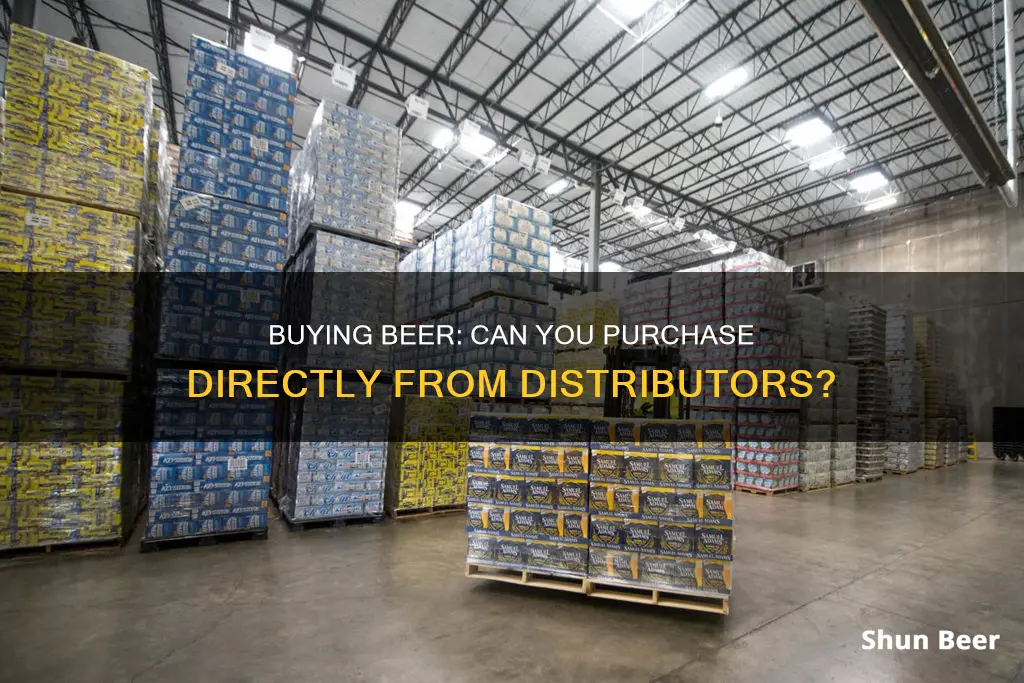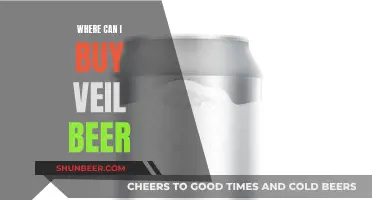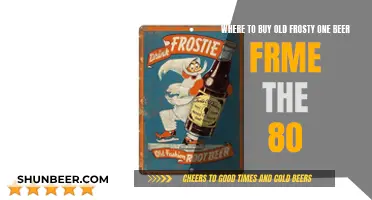
The alcoholic beverage industry is one of the most highly regulated industries, with laws varying from state to state, and even county to county. Most states operate on a three-tier distribution system, where beer is manufactured, sold to a distributor, and then sold to retailers. However, there are exceptions, and some states allow beer manufacturers to distribute directly to licensed retailers. So, can you buy beer directly from a distributor? The answer is, it depends on where you live.
Can you buy beer directly from a distributor?
| Characteristics | Values |
|---|---|
| Wholesale price | Much cheaper than the retail price |
| Who buys from distributors? | Businesses like pubs, bars, and restaurants |
| How to buy from a distributor | Contact a sales rep for a distributor or use a bar and beverage ordering platform |
| How much do bars pay for alcohol? | 70% to 80% less than what they charge their customers |
| How much do bars spend on alcohol? | Small bars: $2,500 to $6,000 per month. Mid- and large-sized bars: $6,000 to $13,000 per month |
| Markup | The standard industry markup for beer is around 200% - 300% |
| Self-distribution laws | Only 16 states and the District of Columbia don't allow self-distribution of beer |
What You'll Learn

Buying beer wholesale
If you're looking to buy beer wholesale, there are a few things you need to know. Firstly, let's understand why buying wholesale can be beneficial. When you purchase beer wholesale, you can take advantage of lower prices. The wholesale price is typically much cheaper than the retail price, which can help you save money and increase your profit margin if you're reselling.
Now, let's discuss where you can buy beer wholesale. One option is to purchase directly from a beverage distributor or wholesaler. Bars, pubs, and restaurants typically source their alcohol this way. You can contact a sales representative from a distributor or wholesaler directly and place your order. Alternatively, you can use a beverage ordering platform, where you can place orders directly with distributors through subscription-based software. This can streamline the ordering process and provide you with insights into vendors, delivery dates, and more.
Another option for buying beer wholesale is to look for bulk beer cases and pallets from retailers or online stores. Some retailers offer discounts and deals on bulk purchases, so it's worth exploring this option as well. You can often find a variety of domestic, imported, and craft beers in these bulk options, allowing you to offer a diverse selection to your customers or stock up on your favourites.
When buying beer wholesale, it's important to consider factors such as the quantity you need, the type of beer (bottles, cans, or kegs), and any specific brands or varieties you prefer. Additionally, ensure that you have the proper licensing and permits in place, especially if you intend to resell the beer.
Lastly, don't forget to compare prices and look for distributors or retailers that offer competitive pricing and discounts for bulk purchases. By following these steps, you'll be well on your way to purchasing beer wholesale and enjoying the benefits of lower prices and convenient sourcing.
The Best Places to Buy Authentic American Beer
You may want to see also

Distributors and wholesalers
The alcoholic beverage industry is one of the most highly regulated industries in the United States. Each state, and sometimes even counties or municipalities within a state, create and enforce their own laws regarding the sale and distribution of alcoholic beverages. This results in a complex web of laws that can be difficult to navigate.
The Three-Tier Distribution System
Most states operate on a three-tier distribution system for alcoholic beverages. In this system, a producer manufactures the product and sells it to a wholesaler or distributor, who then sells it to retailers. Importers are usually treated as producers, placing them into the first tier of distribution. In less-populated areas, some states allow larger retailers to act as distributors to smaller retailers, creating a four-tier system.
Advantages of the Three-Tier System
The three-tier system provides structure and order to the alcoholic beverage industry. It helps ensure that alcoholic beverages are distributed and sold in a controlled and regulated manner, preventing unauthorised sales and ensuring compliance with state and local laws.
Disadvantages of the Three-Tier System
The three-tier system has been criticised for creating a complex and sometimes inefficient distribution process. Small beer producers and microbreweries may face challenges, as they risk receiving minimal marketing and promotion from wholesalers who prioritise larger brands. Additionally, the system can make it difficult for new manufacturers to enter the market, as they are required to sell their products to wholesalers rather than directly to retailers.
Self-Distribution Laws
Despite the three-tier system, many states allow beer manufacturers and importers to self-distribute their products directly to retailers with some restrictions. Only 16 states and the District of Columbia do not allow self-distribution of beer. Self-distribution laws vary from state to state, with some states imposing restrictions such as limiting self-distribution to manufacturers who sell a certain percentage of their products within the state.
Working with Distributors and Wholesalers
When selecting a distributor or wholesaler, businesses should consider factors such as flexibility, trustworthiness, the range of products offered, and delivery options. Building a good relationship with a reputable and affordable distributor can be beneficial for bars, pubs, and restaurants. It is recommended to shop around for both local and remote distributors, compare prices and reviews, and solicit quotes before making a decision.
Best Beer Cheese Dip: Where to Buy?
You may want to see also

Liquor license
The requirements for a liquor license vary from state to state, so it is important to check the specific requirements for your state. Here is a general overview of the process and requirements for obtaining a liquor license:
Obstacles to Getting a Liquor License
When applying for a liquor license, you will need to work with your state's governing agency to determine the type of license you need and the availability of that license. The type of license you need will depend on factors such as the type of establishment you operate (restaurant, bar, hotel), whether you will allow customers to bring their own alcohol (BYOB), the hours and days you will sell alcohol, and if you will be manufacturing alcohol on the premises.
Application Process
Once you have determined the type of license you need, you will need to submit an application along with the required documentation. The required documentation may include your employer identification number (EIN), business license, sales tax permit, health permit, building permit, and zoning permit. The building and zoning permits are used to determine if your business is in a location and facility where it is legal to sell alcohol. The application process can take up to six months for approval, and you may need to renew your license annually or every few years, depending on your state.
Costs
Obtaining a liquor license typically involves paying a fee for the license itself and a processing fee for the application. The cost of the license can range from $300 to $14,000, depending on your state. There may also be additional license fees based on your municipality. Processing fees are usually a few hundred dollars. When renewing your license, you may be required to pay a renewal fee, which can be as high as the initial license fee.
Timeframe
The timeframe for obtaining a liquor license can vary depending on the state and the availability of licenses. In some states, there is a limited number of liquor licenses, which can make new licenses hard to come by. In these cases, you may need to purchase a license from an existing business. The entire process of obtaining a liquor license can take a few weeks to several months, or even longer if there is a waitlist for licenses. Therefore, it is important to plan ahead when applying for a liquor license.
Kilkenny Beer: Where to Buy in the US?
You may want to see also

Alcohol distribution laws
The three-tier system is a framework for distributing alcoholic beverages, with the three tiers being importers or producers, distributors, and retailers. The basic structure of the system is that producers can only sell their products to wholesale distributors, who then sell to retailers, and only retailers may sell to consumers. Each tier is regulated and licensed separately, and all parties must comply with the laws and regulations set by the government. The three-tier system is intended to prohibit "tied houses" and prevent "disorderly marketing conditions."
There are some exceptions to the three-tier system. For example, some states allow an entity to have a part in two of the tiers, such as small breweries acting as their own distributor. Additionally, many states permit wineries to sell bottles of wine on-site to customers.
The three-tier system offers several benefits, including regulatory, economic, commercial, and public health advantages. It provides checks and balances that help prevent tainted alcohol from entering the marketplace and inhibit aggressive sales practices. The system also allows for tax revenue collection and ensures that only licensed distributors and retailers sell alcoholic beverages.
While the three-tier system has been effective in regulating and distributing alcohol in the United States, there are also threats to its structure in the form of alcohol industry deregulation. Advocates of deregulation argue that it can increase state revenue and replace an outdated system. However, critics argue that deregulation can lead to the dominance of certain companies, eliminating consumer choice, and potentially allowing tainted alcohol to enter the distribution stream.
Best Places to Buy 1919 Root Beer
You may want to see also

Alcohol distribution tiers
The three-tier system of alcohol distribution was set up in the United States after the repeal of Prohibition in 1933. It governs the distribution of beverage alcohol by requiring a separation of the three tiers of the supply chain: producers, distributors, and retailers.
Tier 1: Producers/Manufacturers
This tier involves all producers, including brewers, distillers, vintners, and importers of foreign alcoholic beverages. At this level, the products are manufactured and then sold to a distributor, generally at a 50% price increase.
Tier 2: Distributors/Wholesalers
Distributors are the middle tier of the system. They are responsible for purchasing products from producers and selling them to licensed retailers. Distributors handle the logistics such as storage, transportation, and marketing of the products. They also offer a network of contacts and relationships with retailers.
Tier 3: Retailers
Retailers are the final tier before reaching consumers and include licensed locations like bottle shops, liquor stores, restaurants, and bars. They are responsible for ensuring that alcoholic beverages are only sold to those of legal drinking age.
Exceptions and Variations
The three-tier system is not uniformly applied across all states. Some states have become alcoholic beverage control jurisdictions, where part or all of the distribution tier is operated by the state government or its authorised contractors. Some states allow entities to have a role in two tiers, enabling small breweries to act as their own distributor, for example. Many states also permit wineries to sell bottles of wine on-site to customers.
The only substantial exception to the three-tier system is the State of Washington, where retailers may purchase alcoholic beverages directly from producers, negotiate volume discounts, and warehouse their inventory themselves.
Criticisms
Despite its benefits, the three-tier system has been criticised for facilitating massive markups, with consumers paying 150% or more per bottle due to the journey from producer to retailer. The rise of direct-to-consumer sales has also led some to question the continued viability of the policy.
Lupulin Beer: Where to Buy and Enjoy It
You may want to see also
Frequently asked questions
Yes, you can buy beer directly from a distributor. Bars, pubs, and restaurants typically purchase from a local beverage distributor or brewery.
A simple Google search can help you find a beer distributor in your area. You can also reach out to other bar owners.
Distributors offer wholesale prices, which are much cheaper than retail prices. This helps to lower costs and increase profit margins. Distributors also often offer other products such as wine, spirits, and bar supplies.
You can contact a sales representative for a distributor or wholesaler directly by phone or email. Alternatively, you can use a bar and beverage ordering platform, where orders are placed directly to distributors through subscription-based software.







